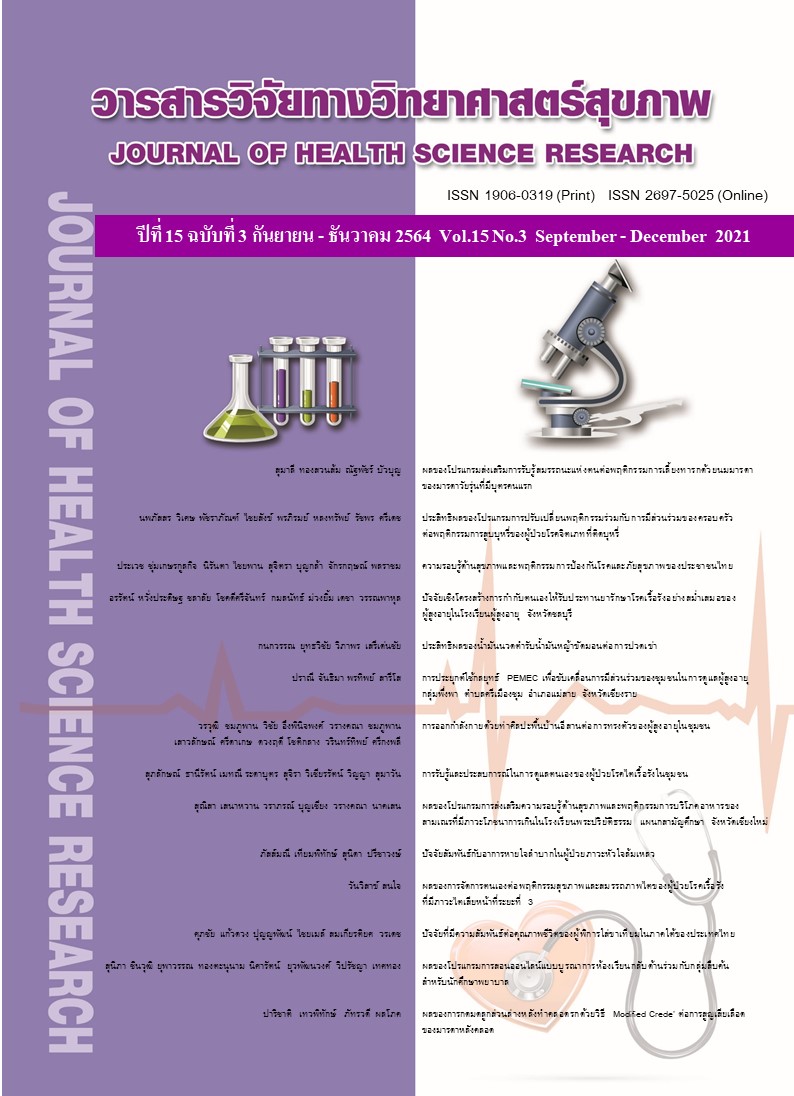ปัจจัยเชิงโครงสร้างการกำกับตนเองให้รับประทานยารักษาโรคเรื้อรัง อย่างสม่ำเสมอของผู้สูงอายุในโรงเรียนผู้สูงอายุ จังหวัดชลบุรี
Main Article Content
บทคัดย่อ
บทนำ : การกำกับตนเองให้รับประทานยาเป็นสิ่งสำคัญ โดยเฉพาะในผู้สูงอายุโรคไม่ติดต่อเรื้อรัง และในช่วงสถานการณ์การแพร่ระบาดของไวรัสโคโรน่า 2019 ที่ทำให้การให้บริการด้านสุขภาพถูกจำกัด การศึกษาปัจจัยเชิงโครงสร้างการกำกับตนเองให้รับประทานยารักษาโรคเรื้อรังอย่างสม่ำเสมอ จะทำให้สามารถทราบถึงปัจจัยที่เกี่ยวข้องกับการกำกับตนเองเพื่อวางแผนการให้สุขศึกษาด้านการใช้ยากับผู้สูงอายุได้อย่างมีประสิทธิภาพ
วัตถุประสงค์การวิจัย : เพื่อศึกษาและตรวจสอบความสอดคล้องของปัจจัยเชิงโครงสร้างการกำกับตนเองให้รับประทานยารักษาโรคเรื้อรังอย่างสม่ำเสมอของผู้สูงอายุในโรงเรียนผู้สูงอายุ จังหวัดชลบุรี
วิธีการวิจัย : ตัวอย่างคือ ผู้สูงอายุทั้งหมดในโรงเรียนผู้สูงอายุเทศบาลเมืองบ้านสวน ที่เป็น
โรคไม่ติดต่อเรื้อรังอย่างน้อย 1 โรค และได้รับยาต่อเนื่องไม่น้อยกว่า 1 ปี จำนวน 147 คน เก็บข้อมูลด้วยแบบสอบถาม สถิติที่ใช้ในการวิเคราะห์ข้อมูล ได้แก่ ค่าเฉลี่ย ร้อยละ และดัชนีชี้วัดความสอดคล้องของปัจจัยเชิงโครงสร้าง
ผลการวิจัย : จากการวิเคราะห์ดัชนีความสอดคล้องกลมกลืนของโมเดลปัจจัยเชิงโครงสร้าง พบว่า 2 = 70.53 มีนัยสำคัญทางสถิติที่ระดับ p = .145 ค่าไคสแควร์สัมพัทธ์ (
2/df) = 1.195 ค่า comparative fit index (CFI), goodness of fit index (GFI) และ root mean square error of approximation value (RMSEA) = 0.958, 0.936 และ 0.036 ตามลำดับ
สรุปผล : ปัจจัยที่ส่งผลต่อการกำกับตนเองให้รับประทานยารักษาโรคเรื้อรังอย่างสม่ำเสมอของกลุ่มผู้สูงอายุ ประกอบด้วย ความรู้ความเข้าใจเรื่องโรคเรื้อรังและผลของการรับประทานยาอย่างสม่ำเสมอ ความรู้ในการตรวจสอบลักษณะของยาและการเก็บรักษายาอย่างถูกต้อง และทัศนคติในการเลือกซื้อยา สมุนไพร หรืออาหารเสริมรับประทานเอง
Downloads
Article Details
บทความที่ได้รับการตีพิมพ์เป็นลิขสิทธิ์ของวิทยาลัยพยาบาลบรมราชชนนี จังหวัดนนทบุรี
ข้อความที่ปรากฏในบทความแต่ละเรื่องในวารสารวิชาการเล่มนี้เป็นความคิดเห็นส่วนตัวของผู้เขียนแต่ละท่านไม่เกี่ยวข้องกับวิทยาลัยพยาบาลบรมราชชนนี จังหวัดนนทบุรี และคณาจารย์ท่านอื่น ในวิทยาลัยฯ แต่อย่างใด ความรับผิดชอบองค์ประกอบทั้งหมดของบทความแต่ละเรื่องเป็นของผู้เขียนแต่ละท่าน หากมีความผิดพลาดใด ๆ ผู้เขียนแต่ละท่านจะรับผิดชอบบทความของตนเองแต่ผู้เดียว
เอกสารอ้างอิง
Department of Older Persons. Situation of the Thai Elderly. [internet]. 2021 [cited 2021 May 9]; Available from: http://www. dop.go.th/th/know/side/1/1/323. (in Thai).
Aekplakorn W. Report of Thai Health Survey by Physical Examination, 5th Edition. Bangkok: Aksorn Graphic and Design Publishing Limited Partnership; 2016. (in Thai).
Chaichanawirote U, Vithayachockitikhun N. Medication use behaviors among older Thai adults. Journal of Nursing and Health Science. 2015;9(1):32-46 (in Thai).
Wongboonnak P, Wongtrakul P, Mahamongkol H, Neimkhum W. The survey of medicine, food supplement and herbal products used problems among elderly: a case study at the community of Tumbon Srisa Chorakhe Noi, Samut Prakan province. HCU. Journal. 2016; 20(39):97-108 (in Thai).
Ruangritchankul S. Polypharmacy in the elderly.Ramathibodi Medical Journal. 2018;41(1):95-104. (in Thai).
Suwannapong K, Thanasilp S, Chaiyawat W. Medication adherence in persons with coronary artery disease: A delphi study. J Health Res. 2016;30(3):149-54. doi: 10. 14456/jhr.2016.21.
Gonzalez JS, Tanenbaum ML, Commissariat PV. Psychosocial factors in medication adherence and diabetes self-management: Implications for research and practice. Am Psychol. 2016;71(7):539-51. doi: 10.1037/a0040388.
Bandura A. Social foundations of thought and action: a social cognitive theory. Englewood Cliffs, N.J: Prentice-Hall; 1995.
Gorsuch RL. Factor analysis. 2nd Edition. Hillsdale NJ: Lawrence Erlbaum Associates; 1983.
Kline RB. Principles and practice of structural equation modeling. 4th Edition. New York: Guilford Press; 2016.
Wongsuwan P. Development of instrument for keep taking medicine and motivation in taking medicine among elderly hypertension in community. Journal of Nursing and Education. 2017;10(1):90-104. (in Thai).
Kanglee K. Factors predicting medication use behaviors of patients with type II diabetes mellitus at Phramongkutklao Hospital. Journal of the Royal Thai Army Nurses. 2018;19(2):170-82. (in Thai).
Srisaart B. Basics of Research. 7th Edition. Bangkok: Suweeriyasanti; 2011 (in Thai).
Browne MW, Cudeck R. Alternative ways of assessing model fit. In Bollen KA, Long JS. editors. Testing structural equation models. Newbury Park, CA: Sage; 1993. p.136-162.
Chaimeekhieo N, Srisaenpang P. Medication self-management among older persons with multimorbidity in community. Journal of Nursing and Health Care. 2017;35(2): 148-57. (in Thai).
Roy NT, Sajith M, Bansode MP. Assessment of factors associated with low adherence to pharmacotherapy in elderly patients. J Young Pharm. 2017; 9(2):272-6. doi: 10.5530/jyp.2017.9.53.
Tipkanjanaraykha K, Saleekul S. Role of nurses in prevention and management of inappropriate medication use in older adults. Journal of the Royal Thai Army Nurses. 2019;20(1):31-9. (in Thai).
Kunlanit S, Powwattana A, Thiangthum W. The effects of self-regulation with home health care on fasting blood sugar among patients with uncontrolled diabetes and hypertension. Journal of Health Science Research. 2019;13(2):73-82. (in Thai).
Nutbeam D. The evolving concept of health literacy. Soc Sci Med. 2008;67(12):2072-8. doi: 10.1016/j.socscimed.2008.09.050.


